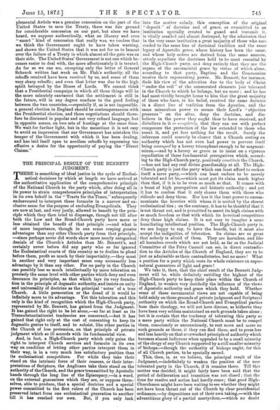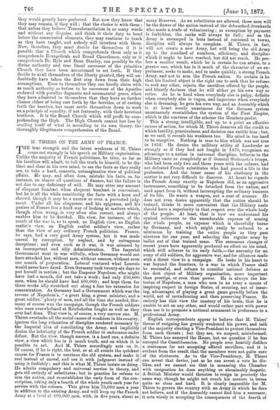THE PRINCIPAL RESULT OF THE BENNETT JUDGMENT.
THERE is something of ideal justice in the cycle of Ecclesi- astical decisions by which at length we have arrived at the authoritative application of the comprehensive principle of the National Church to the party which, after doing all in its power to strain comprehensive principles of interpretation in its own behalf in the "Tracts for the Times," subsequently endeavoured to interpret these formulat in a narrow and ex- clusive sense for the purpose of excluding Evangelicals. They are now at last, and very justly, allowed to benefit by the prin- ciple which they then tried to disparage, though not till after both the Low and the Broad-Church party have more or less obtained the benefit of that principle ;—and what is of more importance, though in one sense reaping greater advantages than any other Church party from that principle, —since perhaps never did words show more nearly categorical denials of the Church's Articles than Mr. Bennett's, and certainly never before did any party who so far ignored the Ecclesiastical courts of this country as to decline to plead before them, profit so much by their impartiality,—they must in another and very important sense reap necessarily less advantage by it than any other. For no party in the Church can possibly lose so much intellectually by mere toleration on precisely the same level with other parties which deny and even denounce its principles, as that which lays its very founda- tion in the principle of dogmatic authority, and insists on unity and universality of doctrine as the principal 'notes' of a true Church. A little persecution or the dread of it would be infinitely more to its advantage. Yet this toleration and this only is the kind of recognition which the High-Church party, represented by Mr. Bennett, has gained from the Judgment. It has gained the right to be let alone,—so far at least as its Transubstantiationist tendencies are concerned,—but it has gained that right only at the cost of consenting to keep its dogmatic genius to itself, and to subsist, like other parties in the Church of less pretension, on that principle of private judgment which so ill accords with its fundamental view. And, in fact, a High-Church party which only gains the right to interpret Church services and formula) in its own way on condition of letting other parties interpret them in their way, is in a very much less satisfactory position than its ecclesiastical competitors. For while they take their stand on the intrinsic force of their reasons, or their inter- pretations of Scripture, the Anglicans take their stand on the authority of the Church, and the grace transmitted by Apostolic hands through the long line of the Episcopacy,—in a word, on the external guarantees which they are, or suppose them- selves, able to produce, that a special doctrine and a special power committed to the first rulers of the Church has been preserved intact from one ecclesiastical generation to another
till it has reached our own. But, if you only look into the matter calmly, this conception of the original " deposit !' of doctrine and of grace, as committed to an institution specially created to guard and transmit it, is vitally assailed and almost destroyed, by the admission that in the very same institution a great majority of those who suc- ceeded to the same line of doctrinal tradition and the same legacy of Apostolic grace, whose history has been the same, and whose holy orders are derived from the same sources, utterly repudiate the doctrines held to be most essential by the High-Church party, and deny entirely that they are the organs of the sacramental grace by virtue of which alone, according to that party, Baptism and the Communion receive their regenerating power. Mr. Bennett, for instance, finds his view of the adoration due to the body of Christ "under the veil" of the consecrated elements just tolerated in the Church to which he belongs, but no more ; and he has had most vividly brought home to him that the great majority of those who have, in his belief, received the same doctrine in a direct line of tradition from the Apostles, and the same miraculous power to secure their Lord's "objective presence " on the altar, deny the doctrine, and dis- believe in the power they ought thus to have received, and disbelieve in it so completely, that they can see with perfect composure the protection of the law extended to those who assert it, and yet fear nothing for the result. Surely the inference could scarcely be clearer that a Church resting on authority which has not even had power to prevent itself being swamped by a heresy triumphant enough to be magnani- mious,—and.by a heresy so grave as to insist on a vigorous repudiation of those fundamental prerogatives which, accord- ing to the High-Church party, positively constitute the Church, —has not had any real divine guardianship at all. The High- Church party is just the party which can least afford to reckon itself a mere party,—which can least endure to be merely tolerated and let be,—which must put its claim much higher than that, if it is to be even as much as that. It comes with a boast of high prerogatives and historic authority ; and yet it has to confess that it only shares them with those who ridicule and deny them. Nor has it the least power to excom- municate the heretics with whom it is united by the closest ecclesiastical ties ; on the contrary, it has to be thankful that it is not thrust out, and is permitted to assert its high claims with as much freedom as that with which its heretical competitors deny those high claims. It is not easy to imagine a mote humiliating intellectual position. The High-Church party is, we are happy to say, to have the benefit, but it must also accept the indignities, of toleration. Its claims are so great that nobody is afraid of them. They are harmless, and like all harmless creeds which are not held, as far as the Judicial Committee of the Privy Council can see, in direct contradic- tion to the Articles of the Church of England, they are to be just as admissible as their contradictories, but no more ! What a position for a party which rests its whole existence on super- natural guarantees of light and grace We take it, then, that the chief result of the Bennett Judg- ment will be, while definitely entitling the highest of the High-Church party to keep their place within the Church of England, to weaken very decidedly the influence of the views of Apostolic authority and grace which they hold. Whether some of these sacramental views are not capable of being held solely on those grounds of private judgment and Scriptural authority on which the Broad-Church and Evangelical parties base their theology, we will not here discuss, as hitherto they have been very seldom maintained on such grounds taken alone ; but it is certain that the tendency of tolerating this party as a mere party within the National Church must be to compel them, consciously or unconsciously, to rest more and more on such grounds as these, if they can find them, and to press less and less heavily on that overworked principle of authority which becomes almost ludicrous when appealed to by a small minority of the clergy of any Church supported by a still smaller minority of bishops,—though the authority of bishops ought, for this of all Church parties, to be specially sacred.
This, then, is, as we believe, the principal result of the Judgment,—indefinitely to weaken the position of the now tolerated party in the Church, if it remains there. Till this matter was decided, it might fairly have been said that the period of deliberation and transition was not closed ; that the time for resolve and action had hardly come; that good High- Churchmen might have been waiting to see whether they might not have been thrust out of the Church by clear providential ordinance,—by dispositions not of their own taking,—with the adventitious glory of a partial martyrdom,—which no doubt
they would greatly have preferred. But now they know that they may remain, if they will ; that the choice is with them ; that unless they believe Transubstantiation in so many words and without any disguise, and think it their duty to bend before the consecrated elements, they may continue to teach as they have taught, and nobody will interfere with them. Now, therefore, they must decide for themselves if it is possible that a Church which comprehends them only as it comprehends Evangelicals and Broad Churchmen, only as it comprehends Dr. Ryle and Dean Stanley, can possibly be the divine authority and true lineal successor of the primitive Church they have been accustomed to set forth. If they decide to avail themselves of the liberty granted, they will un- doubtedly have taken the first step down from their high assumptions. Even to themselves they can hardly claim with as much authority as before to be successors of the Apostles endowed with peculiar dogmatic and sacramental grace, when they have admitted to themselves that they have no further chance either of being east forth by the heretics, or of casting forth the heretics, but must settle themselves down to work on a principle of equality, if not fraternity, with their heretical brethren. It is the Broad Church which will profit by com- prehending the High. The High Church cannot but lose by availing itself of what is, according to its own theory, the thoroughly illegitimate comprehension of the Broad.



































 Previous page
Previous page